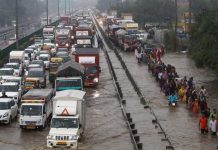 A new dawn has once again set in the politics of erstwhile state of Jammu and Kashmir. Breaking new grounds on issues that remained untouched in more than 70 years, the historic decision on repealing of land laws ‑ a bold step in integrating the Jammu & Kashmir region with the rest of India, has evoked mixed reaction from across the people of Jammu region.
A new dawn has once again set in the politics of erstwhile state of Jammu and Kashmir. Breaking new grounds on issues that remained untouched in more than 70 years, the historic decision on repealing of land laws ‑ a bold step in integrating the Jammu & Kashmir region with the rest of India, has evoked mixed reaction from across the people of Jammu region.
Apparently, the move came more than a year after the revocation of Article 370 and 35A of the Constitution, on 5 August 2019, which accorded special status to Jammu and Kashmir and disallowed outsiders to own land there.
Despite being apprehensive of the order, Rajouri and Poonch people too are happy with the decision, saying they are witnessing huge development projects underway, being carried out by Centre, thus paving way for employment in the region.
Under the new arrangements, no domicile or permanent resident certificate is required to purchase non-agricultural land in the UT. The Union home ministry has also notified the Real Estate (Regulation and Development) Act, 2016, paving way for the acquisition of land in J&K by all Indian citizens. Previously, article 35-A of J&K Constitution, scrapped on August 5, 2019, placed prohibitions on the sale of land to those who were not state subjects.
The legislations repealed as whole include the Jammu and Kashmir Alienation Of Land Act (V of Samvat 1995), the Jammu and Kashmir Big Landed Estates Abolition Act ( XVII Samvat 2007), The Jammu and Kashmir Common Lands (Regulation) Act, 1956, the Jammu and Kashmir Consolidation Of Holdings Act, 1962, the Jammu and Kashmir Flood Plain Zones (Regulation and Development) Act, the Jammu and Kashmir Land Improvement Schemes Act (Xxiv Of 1972), the Jammu and Kashmir Prevention Of Fragmentation Of Agricultural Holdings Act, the Jammu and Kashmir Prohibition On Conversion Of Land and Alienation Of Orchards Act; the Jammu and Kashmir Right Of Prior Purchase, Act [ii of svt. 1993 (1936 A.d.)], the Jammu and Kashmir Tenancy (Stay Of Ejectment Proceedings) Act (Xxxiii Of 1966), the Jammu and Kashmir Utilization Of Lands Act (Ix Of Samvat 2010) and the Jammu and Kashmir Underground Public Utilities (Acquisition Of Rights Of User In Land) Act (Iv Of 2014).
Economic prosperity
“It will be a win-win situation for both locals as well as outsiders,’’ says Lalit Mahajan, chairman, Federation of Industries Jammu (FIOJ), while welcoming the new land laws in union territory of Jammu and Kashmir. Mahajan said that amendments in land laws will certainly give big boost to the industrial growth in Union Territory of Jammu and Kashmir. “Entrepreneurs from outside the State which will open vistas for huge investment in Industrial Sector, Health & Medical Education, Tourism Industry, Real Estate and other sector which will provide job opportunities to local youths in private sector,’’ he added.
“We will like to draw the attention of Prime Minister Narendra Modi, Union Home Minister Amit Shah and Lt. Governor Manoj Sinha that it is the need of the hour to provide State/Central Govt following Fiscal Incentives to existing Units, Units under substantial expansion and new units for rapid Industrialization in our State keeping in mind the factors like locational disadvantage, shallow market within the State due to hostile neighbor like China & Pakistan to attract the new investment in our State in Industrial Sector from outside the State which will boost the J&K economy,” Mahajan said.
Prospects
Tourism acts as a catalyst in the development of the backward regions and Jammu and Kashmir offers vast tourism potential in its all region. Opening of buying of lands would bring in investments from private individuals and multinational companies which in turn will give fillip to the local economy, as due to conflicts ridden region, J&K lags far behind in term of economic development as compared to other states.
Integration of Jammu and Kashmir with the nation also sends a clear message of One Nation through Single Citizenship. Education sector can be build up as more colleges and institutions from outside can boost the sector. Increased investments would lead to increased job creations and further help in strengthening the socio-economic infrastructure in the state.
Meanwhile, terming “one nation, one law and one rule” setup’ a landmark decision towards peace and development in the strife torn region, the people of Jammu and Kashmir are overwhelmed with new amendments that allows outsiders to access J&K’s land, both agricultural and non-agricultural, meant earlier only for permanent residents.
Mixed reactions
“New Jammu and Kashmir land laws are progressive,’’ says Prof Hari Om, former HoD, Social Sciences, Jammu University. He said that Jammu-based political parties and leaders of all hues should rise to the occasion and work for a lasting solution to the issues facing Jammu province and free Jammu province from the clutches of Jihad-gripped Kashmir. ‘I would like to ask those so called leaders who drove Maharaja Hari Singh’s J&K away from the national mainstream in October 1949 by adopting in no time Article 306-A (Article 370) to help Sheikh Abdullah play subversive games, give a particular type of orientation to the state polity and erode the distinct identity of the Dogras? Who repealed and amended Dogra Maharaja Hari Singh’s agrarian laws to snatch land from Dogras in 1950 without compensation and distribute the same among no less than 5.4 lakh persons belonging to the religious denomination to which Sheikh Abdullah belonged, he added.
The upshot of their whole mindboggling formulations is that the new land laws have all the potential of Dogra identity and these negate the contribution of Maharaja Hari Singh.
Prof Hari Om said that unfortunately Jammu-based NC, Congress, PDP and JKAP activists and some others outside these Kashmiri parties have unleashed a no-holds-barred misinformation campaign against the new land laws for the UT of J&K. They are speaking the language of Gupkaris, whose pro-Pakistan and pro-China credentials are well known and their whole agenda is to create a sense of fear among the nationalist and peace loving people of Jammu province so that they would also join the unholy, ill-motivated crusade unleashed by Gupkaris, responsible for the 1990 migration of the miniscule minority of Kashmiri Hindus. They are misinforming and misguiding the people of Jammu province that the new land laws, if applied in their present form, will enable what they call “outsiders” to invade Jammu province, change its demography, occupy the region’s land, buy other properties, give a fillip to the crime-rate, dis-empower the local population, snatch government jobs and jeopardize the interests of the Jammu youth.
It is pertinent mentioning here that the Jammu province has the highest number of unemployed youth . while Kashmiri youth already occupy almost 3.80 lakh out of 4.5 lakh jobs in the government and semi-government establishments in J&K. Jammu youths occupy only about 70,000 jobs — 3.10 lakh less than Kashmir, he said. And still, the Kashmiri leaders have unleashed a no-holds-barred campaign calculated to forcing the authorities at the Centre and in J&K to create more jobs for the Kashmiri youths.
While comparing the population of Bihar and the number of government employees in that state with that of Kashmir, he said the population of Bihar is 9.9 crore and the number of employees 3.10 lakh. In other words, Bihar has 70,000 fewer employees than Kashmir. Kashmir houses only about 60 lakh people. What does it suggest? It suggests that Bihar, which houses a population of almost 16-time more than Kashmir, has less number of employees.
And the rate of unemployment in Kashmir is less than 30%. As for Jammu province, it is over 69%. “Hold a fair census and you will find that the population of Jammu province is at least 8 to 10 lakh more as compared to Kashmir’’, he rued.
He said that the names of encroachers of Jammu’s River Tawi, Satwari Niabat is out. Total number is 688, out of which Hindus are 01 and Muslims 687.
By ending Jammu & Kashmir’s special status in the Indian Union, the Narendra Modi led government at the centre has extended all provisions of the Constitution to the State in one go, downsized the State into two Union Territories and allowed all citizens to buy property and vote in the State.
Advocate Ankur Sharma, chairman of the Jammu-based NGO IIKJUT, spearheading a relentless campaign against those seeking to change Jammu’s demography, welcomed the new amendments and accused the Kashmir-centric politicians’ of engaging in a state-sponsored demographic invasion of the Jammu region.
When asked if he sees threat on account of job as there is already dearth of employment in Jammu, he said as of now they don’t see any threat because whosoever would like to invest will surely come to Jammu, why they will go to Kashmir. Opening of land law will create more employment.
It may be noted that in 2014, an advocate, Ankur Sharma, had approached the J&K High Court and appealed for a court-monitored probe into the transfer of land under the Roshni Act, as he suspected irregularities in allotment of state land at throwaway prices to top politicians and bureaucrats, influential businessmen and high-ranking government officials.
The demographic invasion was reportedly orchestrated with the intention of altering the Hindu-majority character of the region. “Kashmir centric politicians have used J&K’s Roshni act as a tool to change the demography of Jammu. and 50 lakh kanal of land was allotted to Muslims in much lesser price than the market rate in Jammu city.
The “predominantly Hindu majority city has already been encircled by creating a ring of Muslim colonies and settlements as well as building residential accommodations so that a sudden influx of Muslim population into and around Jammu city can go almost unnoticed”.
Keeping all apprehensions at bay, a local shopkeeper in Rajouri town has welcomed the new amendment, saying post abrogation art 370 saw rapid expansion of roads and communications facilities. Many schools and colleges were upgraded.
However, while people are welcoming the new change, students and youth are up in arms after the high-speed mobile internet services were snapped in Jammu and Kashmir on August 5, 2019. Students and teachers have been suffering since last year when the communications restrictions were imposed.
The Jammu youth say that they have been missing lot of opportunities and were unable to compete in national level examinations or job opportunities across the nation owing to the unavailability of the high-speed internet services.
The students are the worst sufferers as amid COVID-19 while their educational institutions have been shifted to virtual classes now, they were unable to follow the classes as not every student has broadband services at ome.
“Jammu is paying for the sins of Kashmir, the government must immediately restore the high-speed internet services in Jammu as we are peaceloving people,’’ says Dhanush sharma, a class XII student. Restoring high-speed 4G mobile internet would, therefore, go a long way to restore the confidence of students of Kashmir. “It is important that Kashmiri students have access to the same learning opportunities as those in the rest of India,” he said.
11 Land Laws repealed
The Government has repealed 11 Land Laws that existed in the erstwhile state of Jammu and Kashmir replacing the old, regressive, intrinsically contradictory and outdated laws with a set of modern, progressive and people friendly provisions. The new land laws will not only afford protection to over 90% of the land in J&K from being alienated to outsiders but will also help revamp the agriculture sector foster, rapid industrialization, aid economic growth and create jobs in J&K.
Rohit Kansal, Principal Secretary, Information and government spokesman, on issues related to the UT of Jammu and Kashmir Reorganisation (Adaptation of State Laws) Fifth Order, 2020, recently remarked that the repealed laws were made to serve the old agrarian-based economy and were required to be modified for modern economic needs. Besides, they were beset with ambiguities, contradictions and redundancies and in many cases, were clearly regressive. For instance, a number of laws had contradictions leading to scope for discretionary interpretation and rent seeking.
He further added the new Land Laws are modern and progressive even while affording adequate protection against alienation of land to outsiders. A number of protections have been built into the new land laws on similar lines as has been enacted in other states such as Himachal Pradesh and Uttarakhand. To begin with, no agricultural land can be transferred to any person from outside the UT of J&K but can only be sold to an agriculturist from within J&K. No land used for agricultural purpose can be used for any non-agricultural purpose.
There are now provisions for setting up of a Board of Revenue, Regional planning for regulating use of land, alienation and conversion, land lease, consolidation and Contract Farming. The Board of Revenue comprising senior officers will not only be the Developing Authority for preparing regional plans but can notify a scheme of consolidation of land holdings and also a scheme for restricting and regulating the fragmentation of agricultural land holdings to make agriculture viable.
New Jammu and Kashmir land laws are progressive. Those who are opposing the new land law are simply promoting the Gupkaris’ pernicious agenda-the agenda seeking separation of JK from India and creating Kashmir like situation in Jammu too. The aim of Gupkar gang is to create another Pakistan
— Prof Hari Om,
former HoD, Social Sciences,
Jammu University
An estimated loss of 25,000 crore was caused to the state exchequer. Repealing of Roshini Act was a major step for defeating the Jihadi war which was about to commence in Jammu in the form of demographic invasion as the illegal occupants had raised multi-storey complexes, palatial buildings, luxurious homes on the state land which was allotted to them at very less amount
— Advocate Ankur Sharma,
chairman of IIKJUT
Living an exiled life for last over 31 years now, Dr Ajay Chrungoo, Convenor, Panun Kashmir, welcoming the new land laws, demands permanent settlement in the separate homeland to be carved out on the North Eastern banks of river Jehlum in Kashmir in accordance to their geo-political aspirations and as per the Marg Darshan resolution of 1991.
When asked don’t he feel that KPs should have been rehabilitated first, then new laws should have been implemented, he said that there are many things which should have been done first, including recognisation of the community, which should have been the priority for all the governments, including the present government at the centre.
“Abrogation of Article 370, and reorganisation of J&K into two Union Territories, and banning Jammu Kashmir Liberation Front has certainly raised hopes, but the state and Centre are yet to start process of reversal of genocide rather than mere rhetoric of creating conditions for return. When you deny reversal of genocide it is genocide, too and it is crime.
The destruction of Hindu homes, temples and shrines was conducted systematically to cleanse Kashmir of Hindus. And while in exile, internally displaced Hindus had to face denial of their genocide. Saying that the abrogation of Article 370, and reorganisation of J&K into two Union Territories, and banning Jammu Kashmir Liberation Front has certainly raised hopes Chrungoo said the real problem was not recognised till recently until the JKLF (Jammu Kashmir Liberation Front) was banned and the government, for the first time, accepted that the JKLF was responsible for genocide of Kashmiri Pandits.
Panun Kashmir chairman said, “We are caught up between the forces that continue to perpetrate atrocities on them and the forces of denial of genocide.” He said denial of exodus of KPs has not only been destructive to others but has also led to spillover of fundamentalism into rest of India. He said that the Panun Kashmir has already submitted the Panun Kashmir Prevention of Hindu Genocide and Atrocities Bill to government of India and hoped that the Bill would be taken up for consideration and adopted as an act in the Parliament of India.













